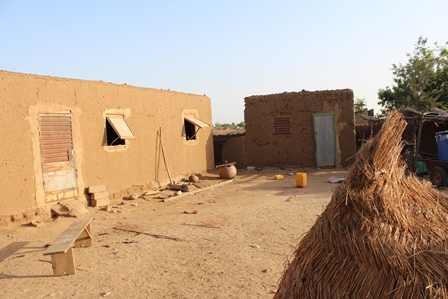Sub-Saharan Africa alone has been more vulnerable to the effects of climate change more than ever. The Intergovernmental panel on climate change predicts that by 2020, crop yields may fall up to 50 per cent and 75-250 million people could be affected by increased water shortages. This poses a significant risk for the generations to come and deny them valuable environmental resources such as clean air and food.
But my recent visit to Burkina Faso seemed to paint a different picture of a country in the Sahel region, which in its own little way is using biogas to adapt to climate change.
Unknown to many, half of the country is merged in aridity and receives 600-1000mm of rainfall annually. With these challenges, many farmers in the country still grow their food on degraded land with poor soils and inadequate rainfall. It was disheartening to see loads of tracks transporting firewood to the capital city Ouagadougou. This shows that deforestation is slowly claiming wooded areas which can be partly attributed to the demand for energy. According to the National Appropriate Mitigation Actions (NAMA) Facility around 101,626 hectares of forest is destroyed in the country each year.
What certainly stood out for me is how bio-digester technology has improved the communities’ resilience to adapt to climate change differently.
Burkina Faso is leading as one of the first countries in West Africa to build a successful commercial market for biogas. With support from development organisations, there has been a deliberate government effort to scale up the use of biogas to the bottom of the pyramid families- who have borne the brunt of climate change.
Before the inception of the national biogas programme it is estimated that a woman in the rural household walked up to five hours every day in search of firewood for cooking and lighting. The Africa Biogas Partnership Programme estimates that this has been made simpler with the use of biogas and currently up to 364,500 people now have a clean source of energy.
It is also estimated that the use of biogas as an alternative source of energy has saved up to 78,430 hectares of forest this year. This has been so successful such that the government has been keen to establish the first ever grid connected biogas plant in West Africa.
Other than biogas, farmers have utilised the biogas bi-product, bio-slurry to transform their land which they once considered as barren. They are now able to harvest up to 20 bags of maize without the use of chemical fertilisers and pesticides compared to a harvest of 7 bags previously.
With the creation of a conducive policy environment, the government has additionally subsidized the biogas market to enable affordability for hundreds of households in dire need of clean energy. As a strategy to combat climate change, the government has further committed to build 40,000 plants by 2020 which will be crucial for food security and providing a sustainable source of energy for its growing population. To date, 10,000 bio-digesters have been built where women and children are no longer exposed to indoor pollution.
The private sector has also played a huge role in market development through biogas construction enterprises- established businesses that facilitate credit schemes and client relationships.
Burkina Faso is an inspiring example of how developing countries in the Sahel region are shifting to climate change adaption through simple and smart technology such as biogas. Not forgetting that the country is amongst the 193 that ratified the Paris Agreement. Other than using donor funding for mitigation mechanisms; countries can choose to incentivise the private sector to grow markets for clean energy and in the long-term enable sustainability of such sectors.
Through biogas, the country is on its route to restoring a socio-economic balance to ensure food self-sufficiency and environmental restoration. Governments in East Africa can borrow a leaf from this success and use it as a model for climate financing in their own countries which will go a long way to climate change adaptation.
The impact of climate change will be felt in the generations to come and there’s need to take a holistic action through fruitful partnerships with the private and public sector to find innovative ways to conserve the remaining environmental resources.




